For a straightforward Outside Broadcast — say, a service from Salisbury Cathedral or a concert by the Bournemouth Municipal Orchestra — the O.B. engineers set up a local control-point which is linked to Bristol or Plymouth by Post Office land-line. In other words, they convert church or hall into a temporary studio. Where several microphones are used their intake is ‘mixed’ by the engineers on the spot, and the result is ‘piped up the line’.
But there are times when this arrangement will not do. There are no Post Office lines to link up with aeroplanes or ships. There are no telephone lines at all, or only inadequate ones, to the more inaccessible islands such as Alderney and Lundy. And how do you broadcast from the back of a moving elephant, or from a rowing-boat on the Severn with the Bore approaching? — to quote two strange items which have been heard in the West of England programmes.
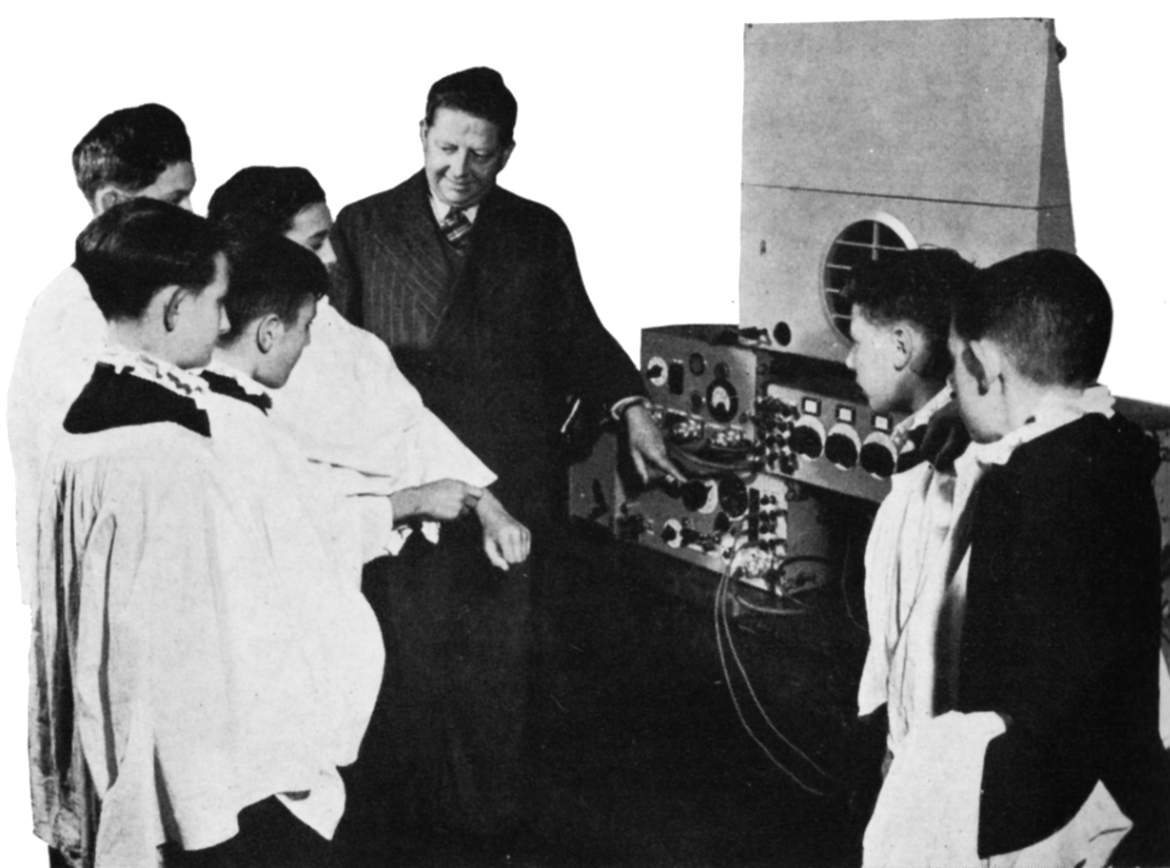
THE SERVICE HAS JUST ENDED – the red light goes out – broadcast over. Church off the air. Time now for questions.
The best solution of that sort of problem is to use a portable radio transmitter, working on ultra short waves. With these transmitters, Jersey, Guernsey, Alderney, Sark, and Herm can easily be linked together—the signals from each island being concentrated on a single control point in Guernsey, and relayed thence to Bristol. Links from ship to shore, from aeroplane and elephant’s howdah work in the same way.
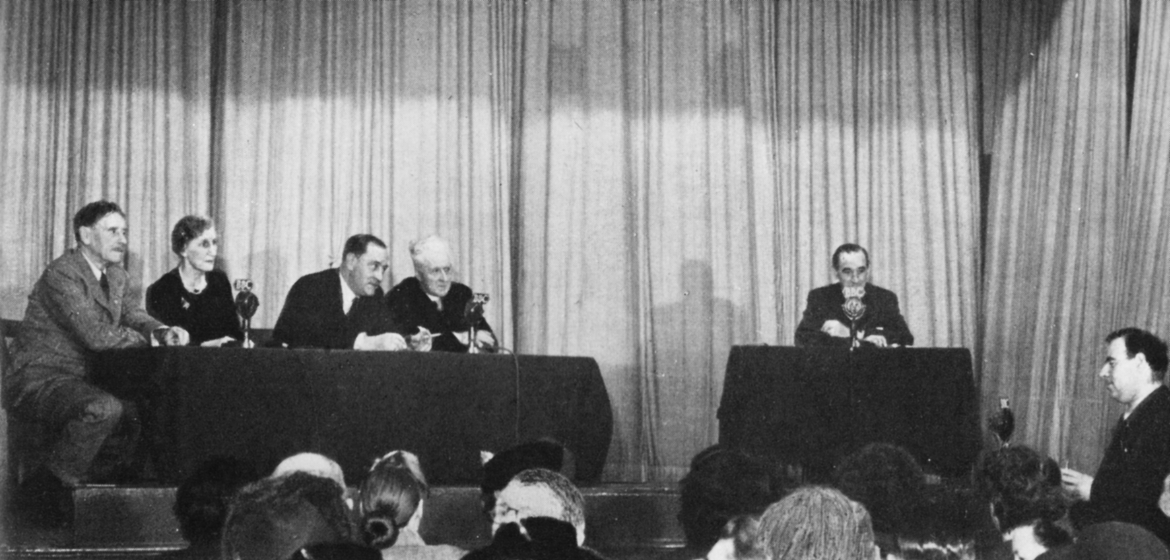
‘THAT’S THE TEAM, AND NOW FOR OUR FIRST QUESTION’ – Freddy Grisewood opens a session of ‘Any Questions.’ Lewis Hastings, Lady Biolet Bonham-Carter, Ralph Wightman, and St. John Ervine, listen carefully as Taunton’s first question is put at the microphone.
By this variety of means the BBC reports, reproduces, and explains the day-to-day events and activities of the West Region. Thanks to it we know, as we never knew before, what is happening in our part of the country; and we have a share in it all, as fireside spectators. The first duty of regional broadcasting is to put on the air the life of the region when and where it takes shape and has value.

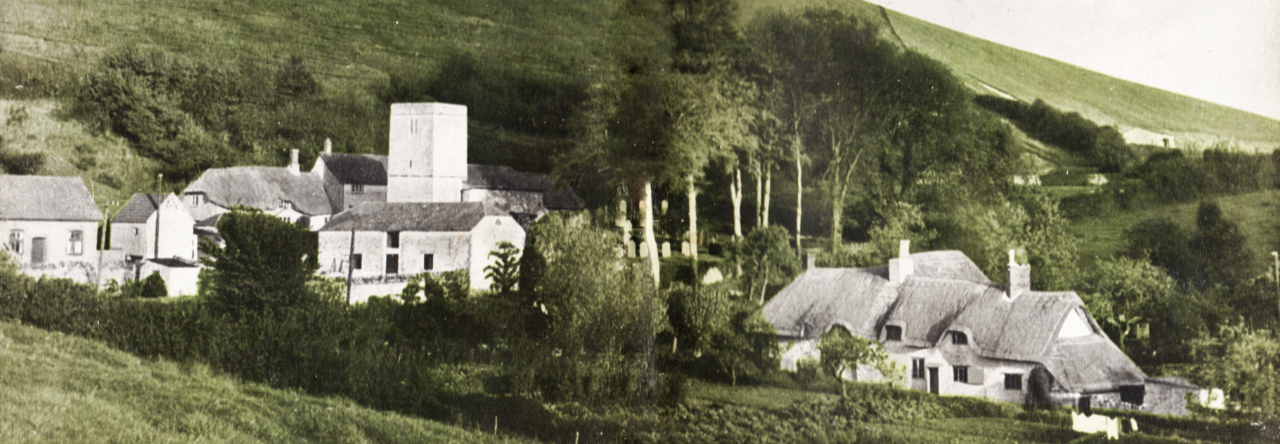
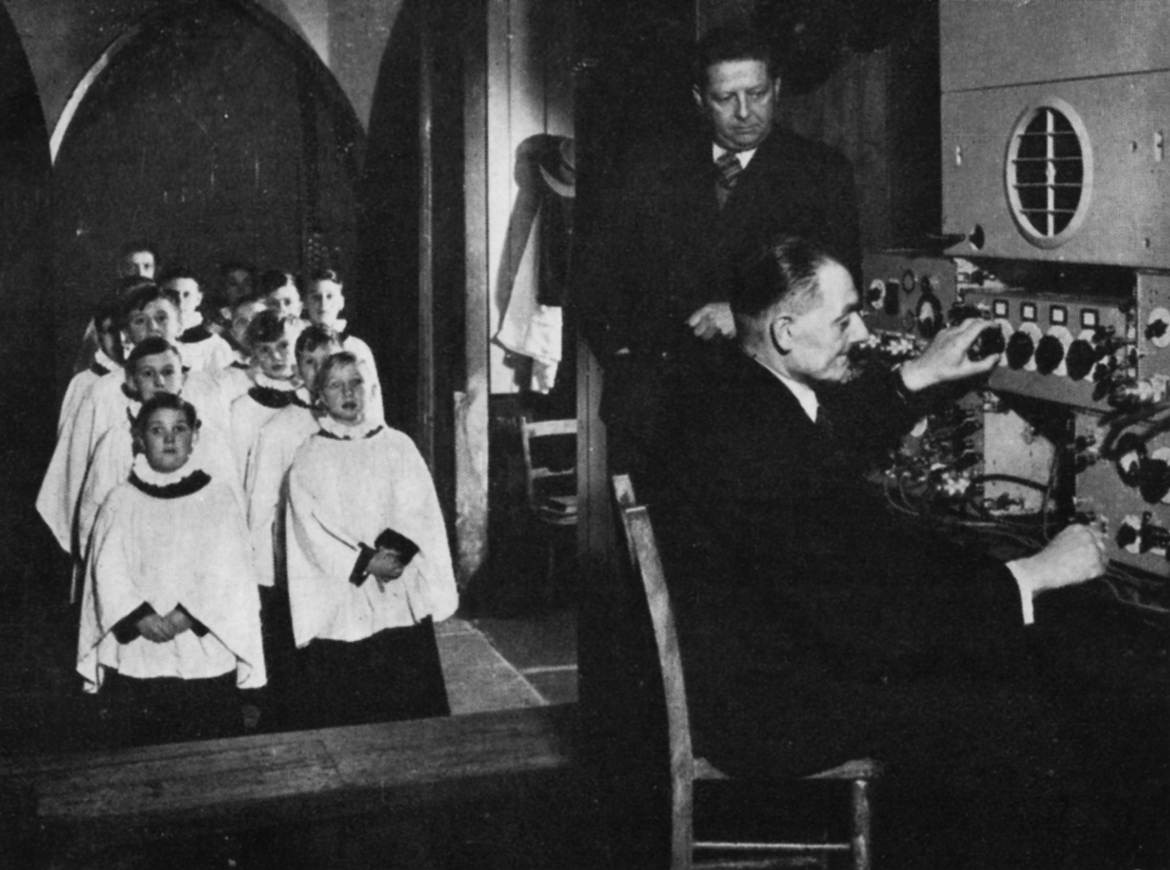

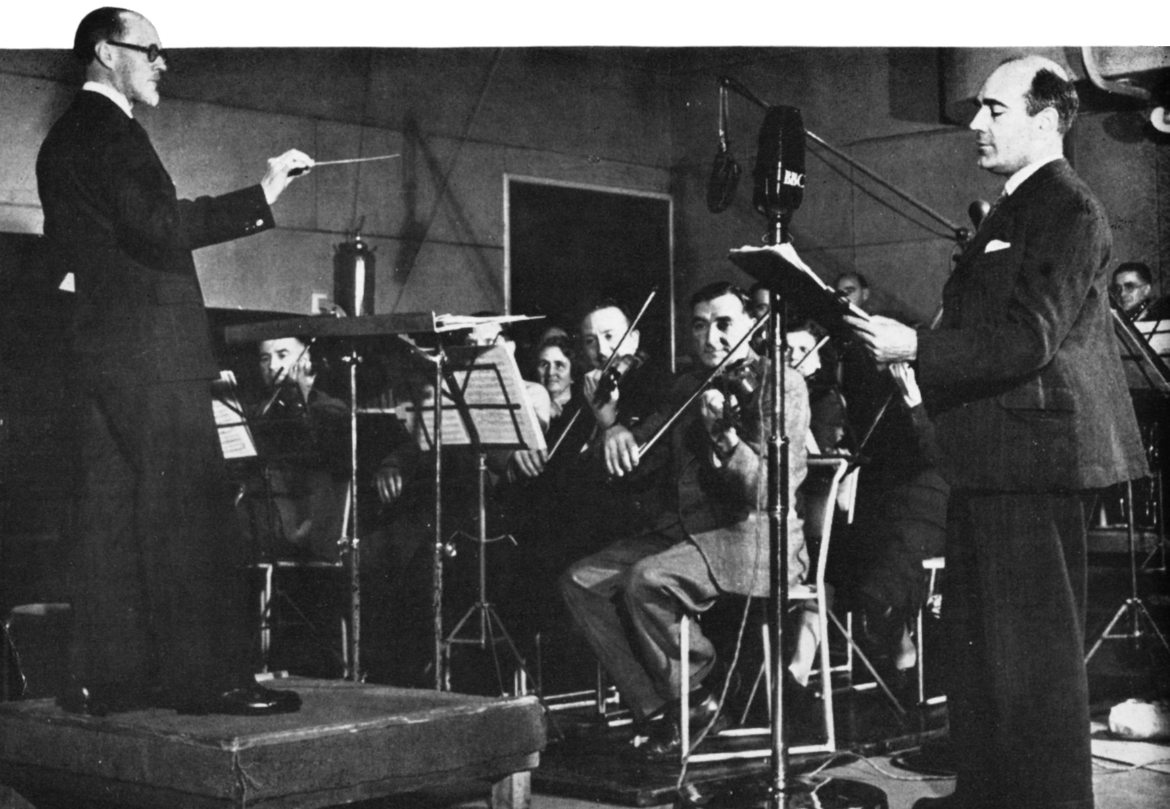

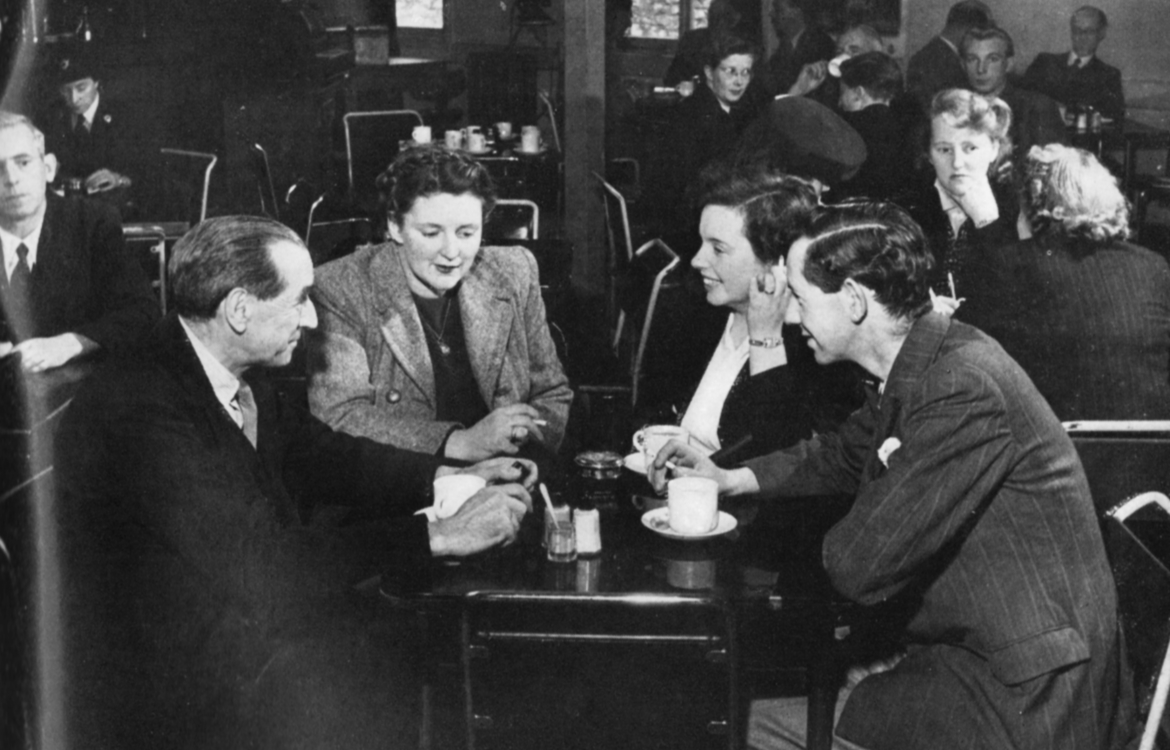
Adding Opinion
By Broadcasting in the West
On 1949
In West of England Home Service
To do all this without adding the sauce of opinion would be to rob the region of much of its distinctive flavour. The west-country, like any other part of Britain, makes views as well as news — views characteristic of its history, its culture, its temperament. And so the West Region sponsors a group of programmes which reflect and stimulate regional ideas and opinions. In Speak your Mind, in Any Questions, in Air Space, it offers an open platform for intellectual controversy with no holds barred—apart from a respect for the ordinary decencies of debate.
‘WHEN IT’S MY TURN, I’LL TELL THEM SOMETHING’ – People at Westbury take turns to speak their minds. Opinions are forthright and spontaneous, and Gordon McMurtrie keeps the ball rolling.
ROBERT WALLER, producer of ‘Window on the West’.
In these programmes the microphone goes to the public. It is wide open to catch whatever subjects engage the attention of the West. In our cities and larger towns Freddy Grisewood introduces teams of eminent speakers to answer spontaneously any question put by a member of the audience, by Lord Mayor, or car-park attendant, or district nurse, by anyone who will come to the microphone and put a query. The result is heard in Any Questions. In Speak your Mind, which goes to the smaller towns, it is the audience which answers the questions. Gordon McMurtrie puts queries sent in by listeners, and volunteers from the audience give their answers. ‘Are country people better fed than townspeople?’ ‘How much pocket-money should children have?’ The citizens of Blandford or Caine or Crediton get up from their chairs and converge on McMurtrie and his microphone: and there are fireworks and humour and lively debate until the question is thrashed out.
‘THINKING ALOUD’ – In the Bishop’s study the Reverend Frederic Greeves of Didsbury Methodist College and the Reverend Martin Willson, who organizes West Region’s religious programmes, plan a new series of broadcasts with the Bishop of Bristol.
And for those who aren’t present, for the mass of listeners who probably want to contradict one speaker or the other, there is Air Space which carries on the argument — and starts new ones — by correspondence. This is the West Country’s radio equivalent of a letter to the press, broadcasting comments on programmes, on opinions expressed over the air, on any sort of subject which has regional interest. And to give shape and pretext to this open forum of opinion, there are two further programmes dealing with public affairs. The West at Westminster summarizes the attention of Parliament to matters in which the region has a stake and reports the activities of west-country M.P.s; and County Commentary provides a platform for prominent west-country journalists to speak on local topics of their own choice, to give us in fact a leading article over the air.
L.K. WAY of the ‘Western Morning News’ who gives West region listeners a fortnightly review of west-country affairs and personalities in Parliament, has a word beforehand with Honiton’s M.P., Cedric Drewe.
Taken together, this group of programmes is something quite revolutionary in our public life. It is not entirely fanciful to say that not since Wessex ceased to be a kingdom—which is going back more than somewhat — has the West had the means of forming any unified opinion about its own affairs. In this field regional broadcasting fills the gap between the national press and the local press and should bring greater vitality to both. On many issues the west-countryman’s point of view is different from the Londoner’s or the Scotsman’s. It is the province of regional broadcasting to reflect that distinctiveness and make it articulate — a fact that Parliament recognized when it called for the establishment of a Regional Advisory Council to ensure a ‘close touch with movements of thought and opinion’ in the region.